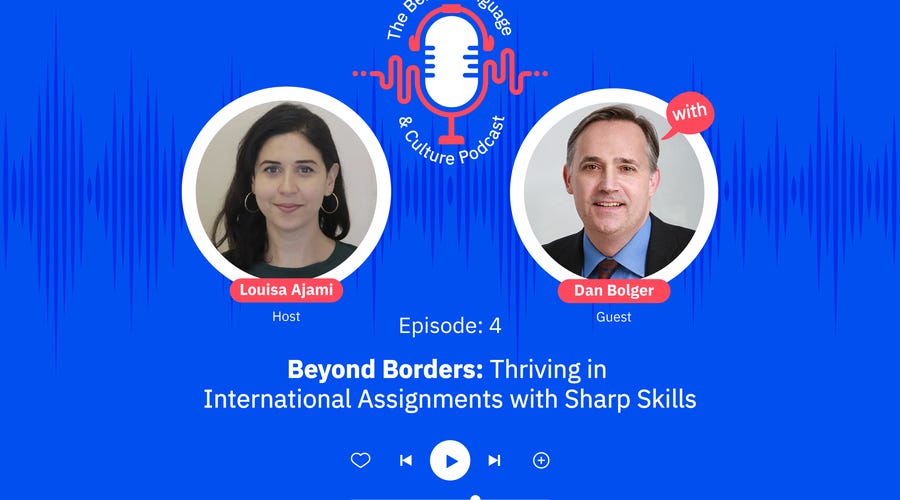
"Beyond Borders: Thriving in International Assignments with Sharp Skills" with Dan Bolger [Podcast]
Author:
Berlitz
What does it take to succeed in an international assignment when you're on your own from day one?
In the fourth episode of the Berlitz Language and Culture Podcast, global business and security expert Dan Bolger shares his experience relocating to Albania with minimal support and the essential lessons he learned along the way.
From overlooked onboarding gaps to the power of cultural awareness, language skills, and personal resilience, Dan offers practical advice for professionals and organizations preparing for global deployments. This episode is a must-listen for HR leaders, expats, and anyone navigating cross-cultural careers.
Transcription Episode 4
(INTRO) Dan Bolger: You know, I think many professionals in their mid-career or approaching senior executive level will articulate that in order to be successful, you also have to be a lifelong learner and engage in different self-led educational experiences. And I would absolutely agree with that, especially in an international assignment.
Louisa Ajami: Welcome to the Berlitz language and culture podcast. On today's episode, we're excited to welcome international business communication and security expert Dan Bolger. Dan, whose most recent assignments have taken him to the Balkans and Central Asia. Has extensive experience in global assignments, international development and cultural assimilation, having recently returned to the US following several years in Albania, Dan is full of important business and cultural insights learned during his deployment as a cultural coach and speaker of several languages, including Russian. Dan has worked in the private and governmental sectors, and as a Berlitz alum supporting relocating corporate execs and their families, Dan can appreciate from his own experience the challenging dynamics of international assignments and the impact on professional and personal development. Welcome to the podcast, Dan.
Dan Bolger: Thanks so much, Louisa, it's a pleasure to be here. Great having you
Louisa Ajami: So Dan, your recent experience in Albania was Overall, a very positive one, but it didn't start out so easy. You weren't given much training or guidance ahead of your move there. Can you tell us a little bit about your first few days in Albania?
Dan Bolger: Thank you again. Louisa.
There were challenges from the get-go on my assignment in Albania. But prior to explaining the some of the interesting details about a place like Albania, there's some nuances one has to accept with international organizations. You know, these multilateral institutions like the United Nations or relief agencies like the International Rescue Committee, Save the Children, and such, they hire you with the understanding that you already have international experience and with that a familiarity with less than comfortable or easy circumstances. Part and parcel of the hiring process is to vet whether you can rough it and improvise and navigate with a measure of uncertainty. And so I took the role in Albania with the Organization for Security and Cooperation in Europe, also known as OSCE, which is a 40-year-old peace and security organization based in Vienna, Austria. It was formed in the 1970s during the nuclear disarmament agreements between the US and the Soviet Union. It's made up of 57 participating states, of which the US and other countries are in Europe are made up of. And so I was hired as a senior media officer to a field mission for this organization, it was one of several offices in the Balkan region of Southeast Europe that serve as outposts for their broader mission.
Once hired, I was not really oriented by anyone from the field office, nor from the Vienna headquarters. The only communications consisted frankly of a few emails and some explanations about small expense reimbursements and any training or orientation plan was to be done on the job in country once I'd already started.
As part of you know, as you can wait, I any training or orientation planned for was to be on the job in country and part of compulsorily wait in country and part of compulsory online videos to be completed during the first months of the assignment. So essentially, I was given a plane ticket and a promise to have my expenses for one-way taxi from my home to the airport and to the Toronto Airport to a hotel. Extra baggage would be discussed and haggled about later. I had four suitcases in all, that was the extent of my possessions.
No one was assigned to meet me at the airport. I was essentially provided three days in a hotel upon landing. During those three days, I was expected to find an apartment. I had little understanding of the city environment. If I did not find a location to stay for my duration, then I had to pay for additional days out of my pocket, whether Airbnb or other options I had to pursue on my own. I did rely upon one loose connection to an American expat on the ground who was serving in the mission, and she served as an incredible lifeline. I also communicated with one other American who had traveled to the country previously in some phone call exchanges. It. But no formal staff Buddy was assigned by the mission to help me settle in. No relocation services from a third-party provider to speak of were offered, essentially, I had to land, settle, and integrate on my own. I did manage to cajole and charm one of the finance team members in the mission to help set up a bank account, which was important because there were no major banks of any of any standing in the location in the country. I was also partially being paid in Euros for my local housing and expenses, part of the work and adventure of a role like this, serving with the OSCE in a field office, is to quote, rely upon the I'll repeat, part of the work and adventure for a role like this As Blanche D is to quote, rely upon the kindness of strangers. UBois once said in The Streetcar Named Desire.
Louisa Ajami: It sounds like what we would call a baptism by fire. They sort of expect you to get there and hit the ground running, literally after three days or so of adjustment. So that must have been quite an experience, and you were able to rely on people who ended up making it a little bit easier for you. I suppose we can imagine what might have happened if you wouldn't have been able to do that, it would have been a lot rockier. Now, considering your own expat experiences throughout your career, what are some of the areas that organizations should cover in their training ahead of sending their employees abroad? You mentioned quite a number of things, such as housing, setting up a bank account, securing transportation. What else can you tell us about that?
Dan Bolger: Well, again, Louisa, I think some activities and training and preparation, such as cultural training, can be of incredible use and effectiveness, both living and working in a business context. Language Training in Albanian could have served me quite, quite well. Absolutely. I would also say Country Briefings about the country and government that I was going to be serving could prove to be incredibly important beforehand, but I had none of that. But and also to consider Country Briefings on some of the neighboring countries as well that are adjacent to Albania, just so you have broader political context. I also think that the support provided to an individual who has landed and is is assigned to serve in a particular field office should be provided a bit more background and assistance with the financial dimensions of of their life in the country, I mentioned a bank account before, but also managing with the different currencies, also taking into consideration your insurance and your health care, medevac, if need be, if, for heaven forbid, some incident may have happened that might be of a major circumstance, also getting a local ID card, or sort of the equivalent of a social security card as well. If you're traveling to a place like Albania and you have a family with you, then local schooling for children is also of great importance. And understanding some of the university options that might be available too, not just for children who might be somewhat older, or family members who might want to take courses while you're there. I think additionally, organizations should explore and take quite seriously or make it more institutionalized, would be introduction to the organization's protocols, how to do your job in that location. Because quite often when you're working for an international organization, as I was, and it was my first experience with this particular multilateral institution, there are, there's a certain language, there's a certain verbiage, standards by which they operate, that I think could have been quite beneficial during my orientation to the location. And additionally, I think this, this may, on the surface, seem to be perhaps extra or just a value add, but most definitely, I think an introduction to some form of training and global teaming management in an international context in matrixed organizations could be immensely helpful. And then individually. If you're in a leadership position where you're managing folks, and you have several direct reports, executive coaching to a more sort of refined detail, could come in immensely handy. And also if the organization itself happens to have a mentoring system, to be a part of that whole process. These, these kinds of things can could be of great value for this kind of position.
Louisa Ajami: In your response, there, you covered two of the four key cultural skills that we talk about here at Berlitz with our cultural orientations approach due diligence, which is completing as broad a scope of preparation as possible to prepare for differences in culture, business, culture, learning, culture, managing, culture, as well as mentoring. Mentoring is really an often overlooked step when it comes to integrating new people into an organization, whether that's a local organization, or whether this person has moved to an entire new region of the world. Now, in your response, you spoke a little bit about families, families moving. Your most recent assignment, however, was a split relocation, meaning you went alone without your spouse and children. Is this type of arrangement common in your experience? And do you think it made things easier for your family?
Dan Bolger: Well, just one understanding about that, that form of relocation and deployment, this kind of arrangement is not suitable for everybody, whether it's for their individual circumstances or for their professional trajectory, if you will. I chose to do the split relocation option, not bring my family to the new destination for certain considerations related to the education of my children, as well as my wife's professional considerations; she happens to be a professional filmmaker. Lives in New York City area, and it was important for her to remain in the United States while I was on assignment. And so we chose this one dimension of a split relocation is location. I was presented with this offer to work in Albania, for my experience, for my media development background, and there was a specific need for that particular talent, and working for an international organization, it was important that we chose a destination that was at least suitable for me to carry that out. But some locations do happen to be accommodating to families. Some locations do not. Albania happens to be a very family-friendly environment with less risk. It has a certain element of safety and security associated with living and working in the destination. However, in my circumstances, the educational piece was really important, and it didn't seem to fulfill that particular need that I had. And so we chose a split relocation and I served in a solo capacity. Also, I think that there are some professions where the split relocation opportunity is more common, and that might be, again, with international organizations. It might be in the oil and gas industry. It might be in the extraction industries. Also, higher education might also require a split relocation arrangement because of the terms of your assignment. And so I think some of the more challenging dimensions of this kind of deployment is number one, it would be communications, maintaining communications with your home and family. It's not easy. The type of family cohesion that you have within your own family is has to be mature. It has to be well developed, and a degree of trust has to be in place. Your relationships and bonds have to be willing to flex, but also have a certain endurance about them. One other aspect is finances. It has to be worth your while to do this. You're essentially living in. Two households granted. Cost of living in a place like Albania was affordable, was economical. However, one has to be Monet right? One has to take into account the financial dimensions of your second home of record. Also, you have to have support mechanisms in place, extended family in the home location that can be there for support, not just emergency situations, but I think, over the course of time, to offer assistance to the you know, the solo parent managing the family. Additionally, health care is another consideration, not just for you in your international assignment, but also on the home front, to ensure that that is consistent and supportive. And additionally, the folks in the home location need to have consistent life activities, outlets, engagements and rituals that will sustain them while you are on the international assignment. So most certainly, it's not for everyone, and can be daunting, but it can work for some individuals who have a professional opportunity that can really bolster one's career.
Louisa Ajami: There's so many considerations to take when larger family units are involved, absolutely now, some organizations dismiss cultural training as a soft skill in quotes, and they don't necessarily want to spend a lot of resources on it, reviewing what we've been talking about, a lot of resources are required. What are some of the risks to organizations that don't provide training ahead of sending their personnel overseas?
Dan Bolger: What you know, it's fascinating, because I have come to believe not just as an international sales professional, but also on my international assignments, modalities like cultural training, truly are in no way soft. And in fact, legendary CEO Jack Welch. He was the leader of General Electric for many years, he was quoted as saying, soft skills get little respect, but they will make or break your career. And it's absolutely true. I prefer to reference certain skill sets as sharp skills rather than soft. Actually, there are dimensions of management skills that you must wage in a foreign environment that are not technical in nature, but you must rely upon them and deploy them. And I think from a from a management standpoint, when you're on an international assignment, you have to utilize exercise and factor in degree of judgment, subtlety, nuance, irony, an understanding of shame, orientation, a great appreciation for gender dynamics, the ability to to improvise, exercise patience all of these different dimensions are, you know, are part of a toolkit, if you will. And I refer to them as sharp skills, because it's something that you definitely have to practice, you have to hone and you have to refine. So I think that's that would be my one takeaway in regard to cultural training, language training and other forms of resources and support prior to an international assignment.
Louisa Ajami:I like that sharp skills, they do have to be honed. They are something that you have to keep up, and it's as important as cooking with a sharp knife. Now, going from the organizational level to the individual level, what are some things that people moving abroad should try to learn before they set off to their new location? Whether or not their company has provided any sort of cultural or language training?
Dan Bolger: Yeah, you know, I think many professionals in their mid-career or approaching senior executive level will articulate that in order to be successful, you also have to be a lifelong learner and engage in different self-led educational experiences. And I would absolutely agree with that, especially in an international assignment. This, this becomes crucial. I kind of look at the. Are working in an international deployment, as to use the high school analogy, playing an away game every day, because the arena in which you're operating is unfamiliar, is new, is different from your typical place of operation and foundation, and so being able to upskill and train is really important you. You also have to remind yourself in that new that new location that you're not at home. You know people that you are encountering, working with, managing, delegating to, they're wearing a different set of lenses. And so I think it becomes absolutely crucial to invest in your own leadership skills, whether it's live training, webinars, books. Also to invest time in learning the history, the literature, the political science, cultural resources of the country where you're going, you'll need to understand the landscape and mindset of the place as well as that of the neighborhood and the region in which that country is situated. Additionally, and this may sound a bit surface and peripheral, but make a plan for staying healthy and remaining in shape. There's lots of stress to be working outside of one's comfort zone constantly. If you're going to be solo, be ready to plan and cook and forage and furnish your new location by accessing local markets and making do with what's available. These kinds of outlets and activities are going to be essential for your own well-being and peace of mind. And you also have to remember that, you know this is not a two to three year vacation.
You need to take care of your life and self and continually have that sense of purpose while you're on the assignment. Yeah. Also, I would say that one should very actively try to garner as many on the ground contacts or connections to enable you to to build your network in that location. But one other piece of advice that an experienced international expat professional once told me is that it is also incumbent upon you to maintain, sustain and build your contact at home. He used to refer to it as networking your way back to your home destination, because after your assignment comes to a completion, you're going to be looking for something new. There aren't necessarily folks within your company or organization who are looking out for you. You have to do that yourself. And lastly, also something not to to take lightly is consult with your financial advisor as well, because your financial health taxation especially needs to be attended to very diligently while you're working on international assignment, because there are other you're dealing with other aspects of your financial management…
Louisa Ajami: Absolutely, absolutely. And that also includes, you know, of course, cost of living, differences. And as you not mentioned taxation back home, you have to keep in the black in both locations. Yeah, there's throughout our conversation, we've covered so many things that need to be done, need to be accounted for, and it's such a huge amount of work and preparation. But international assignments can be so gratifying and such a great learning and growth experience that you take back with you even after your assignment is over, whether you stay with the organization or move to a new one, you're taking those skills and those experiences with you for the rest of your life, for the rest of your career. So it's such an amazing experience, and I'm so glad that you had the chance to work across such a large swath of the world and to use those sharp skills as well as the other skills that you needed to use for your job there. And I just want to thank you, Dan for joining us today, and thank you to our listeners. Please join us again for more expert insights on the Berlitz language and culture podcast. Thanks very much.
Dan Bolger: Thank you. Louisa.
Explore more of our Berlitz Language and Culture Podcast, here.


